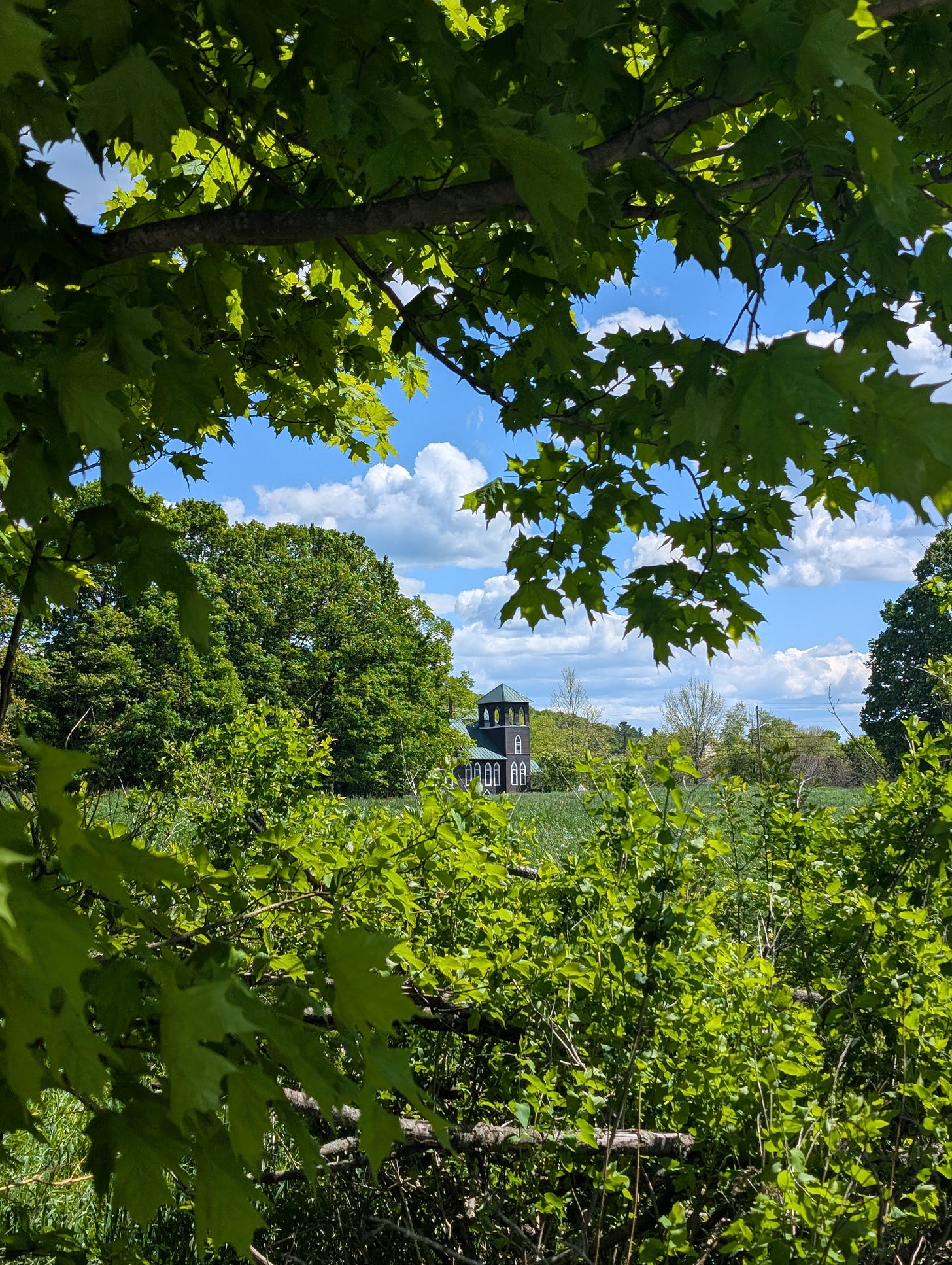The Last Page
Come, Lord Jesus
The Spirit and the bride say, “Come.”
And let everyone who hears say, “Come.”
And let everyone who is thirsty come.
Let anyone who wishes take the water of life as a gift.
(I warn everyone who hears the words of the prophecy of this book: if anyone adds to them, God will add to that person the plagues described in this book; if anyone takes away from the words of the book of this prophecy, God will take away that person’s share in the tree of life and in the holy city, which are described in this book.)
The one who testifies to these things says, “Surely I am coming soon.”
Amen. Come, Lord Jesus!
The grace of the Lord Jesus be with all the saints. Amen.
Revelation 22:17-21
My grandmother is an avid reader and always encouraged us to read too. She was a teacher in Alabama and even served on the school board. She had an unusual approach to reading, though; I don't know if this was later in life or what, but at a certain point, the first thing she would do with any new book is read the very last page first to make sure it had a happy ending before she read the rest of the book. “I don't want to read it if it doesn't have a happy ending,” she’d say. Well, that’s certainly pragmatic! That way if you’re in some Stephen King book—okay, I don’t know if she reads Stephen King, and I don’t know how many cheerful endings he has—if you know how it ends, you can keep going through the dark…or you can say, “Nope, nevermind, I’m good.”
Today, in Revelation 22, we read the last page of our Book. And it is good news. But we also have a cliffhanger that the author of Revelation leaves us with: “Come, Lord Jesus!” Amen. Come, Lord Jesus.
It still moves me to hear those words: “Come, Lord Jesus.” You can hear John’s joyful anticipation, the way he is living in a cliffhanger too; we're always kind of living at a cliffhanger when we walk in faith. For as long as people have read these texts, people have wondered, was the prophecy fulfilled? Or will it be? Did Jesus actually come? Will he? In a word: yes. Christ has come, Christ is here, and Christ will come again. It's everything all at once, all stretched out in God's time dilation; it is always appropriate to pray, “Come, Lord Jesus.”
We've all had those times when it felt like we were at the end of our story. Something happened, and it felt like it was going to define our entire narrative for our entire lives. To be sure, we've all had moments that are among the most important chapters of our lives, the chapters without which the rest of the story wouldn't make sense. And sometimes it feels like this current chapter will never end.
But God lets us read to the end. The Author of Life has given us the last page.
That’s how we get through the chapters that feel like they're being written by Dostoyevsky or Faulkner. Sometimes it feels like you can't even read the chapter you're in; it's all happening too fast, too confusing—who are these characters anyway? Sometimes it feels like you're in the middle of a Flannery O'Connor story, and it's just the darkest thing you can imagine. Sometimes it feels like you're writing your own story for a while, and then suddenly the pen is taken away from you. Sometimes it feels like God is writing a story that's totally unfair, and for whatever reason, other people can't see just how unfair it is.
Yet never forget, friends, that we who claim Christ can trust in the Last Page. And because we know the Last Page, part of our call is to accept whatever chapter we're in and still manage to live in hope, because we know this chapter isn’t the end of the story. Wherever you are today, no matter how bad it is, it is not the end of your story. We’re not on the Last Page.
How do we know? It’s obvious, on the one hand, when the final battle in Revelation seems like an unreal epic, and Christ is not here in the fullness of his glory. Or is he?
Though we may say, “Come, Lord Jesus,” calling him into the absence we feel, in faith we know that Christ is already here more than we can realize, throughout all the chapters, just in the same way that we see Christ all throughout Scripture. Sometimes, we Christians get in trouble with our Jewish friends for this—and I respect where they're coming from in their perspective—but we even say Christ was present in the Old Testament, not always in the ways we expect. And just like a great book or TV show where you rewatch it and see everything you missed, we believe that Christ is right there in the midst of some of the horrible things done in the Old Testament. Christ was somewhere in the midst of darkness and despair.
Last week in the Book of Lamentations, we sat in the unanswerable question: “how.” This past week in our grief share program, we sat in another really hard question: “Why?” Why am I going through this? Why God? (Famously easy questions for a pastor to answer.)
No, I can’t answer that “why.” I can say that sometimes in a great book, you don't ever really know why; the story just unfolds chapter after chapter, and the author might make some things explicit, but also gives you the freedom to discover the full depth of the meaning. They say a great writer knows how to “show, not tell,” and even though the Bible tells us many things, it shows us many more.
No better example of “showing” is in Revelation, whose very name kinda means “showing,” more specifically, “unveiling.” Revelation is a famously hard book to fully exegete (interpret), and it’s unclear to me whether John of Patmos really knew the full why. Oh, he gave us lots of “what” and “how,” and I know he knew some “why,” just as we might. But surely he was also befuddled at his own visions, even as he was being bedazzled by them. Surely he could barely analyze what he was seeing, he just knew he had to write it down and bear witness. And he knew that though he had every reason to be afraid in his confusion, the shock, and the overwhelm, he could see that God was in control in the midst of this battle of good and evil.
And so John of Patmos’s last cry to Jesus is not one in fear. He does not cry in trepidation. He’s yearning, but he’s not desperate, and he’s not confused. He cries with the sound of Christian hope that allows us to be in darkness, face evil, and still find a way to love, and he cries out boldly: “Come, Lord Jesus!”
This might sound crazy to some of you, but these are some of the most inspiring words in the Bible to me. They give me goosebumps as I can almost hear him say it: “Come, Lord Jesus,” in the midst of it all. John is an island prisoner, cut off from his people. When Christians were being persecuted by the Empire, he couldn’t help but smile as he said, “Come, Lord Jesus.”
We can pray that too. Maybe you won’t be as bold and confident as John. Maybe you’re not as sure about the Last Page as he is. It is okay to cry out in pain to God in a different way, just as the psalms do, “Where are you, God? Come!” We can’t always see him when we pray. Maybe we often can’t. And yet whenever we quietly pray, “Come, Lord Jesus,” we can do so with the full trust that he’s already here, for he has not orphaned us. (John 14:18)
This is what John of Patmos sees. He sees that some awful chapters of human history are being written. He is shown some of the cosmic battles with evil in this “unveiling.” And yet he hopes.
Christian hope is a funny thing. Christian hope is not naive, but Christian hope is that which allows us to see more clearly, because it is not a desperate hope. It is a confidence in God. We don’t need to be desperate in our fear and compound bad situations with worse decisions. With hope, we can see things more for what they are, including evil. Without that hope, we might scramble looking for things that don't make sense and put our hope in other things that cannot really give us the hope we want. We might say, "Sure, sure, ‘Come, Lord Jesus.’ Well, I checked my Google calendar and God's not coming tomorrow. So, let me get to other things that are more important.” But friends, this is one of the most important things we can hold onto, all three: Christ did come, Christ has come—right now—and Christ will come again. All three working at once are the foundation of our hope, written on the Last Page.
When you're in the middle of something, and it's so horrible, it's dark, it's twisted, and it's heartbreaking, some of us will keep going simple because, well, what else is there to do? But like my grandmother’s reading, if we are struggling to keep going, remember only Christ is the author of the last, last, last page.
Then, in the very moment our hearts ask for Christ to come, we will know it in our bones that he's already here.
So we can pray together: come, Lord Jesus, help us not be afraid. Come, Lord Jesus, help us not get sidetracked with our stupid, sinful pursuits and distractions. Come, Lord Jesus, help us be strong and take heart. Come, Lord Jesus, help us trust in you. Help us bring justice where there is none, and help us tend to the good life while we wait for you. Come, Lord Jesus, show us what is the right path today for us to take, just the steps ahead of us.
Come, Lord Jesus; but we know you are already here. Come, Lord Jesus. Amen.





